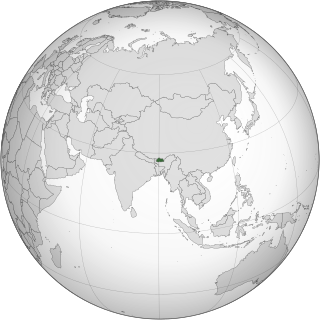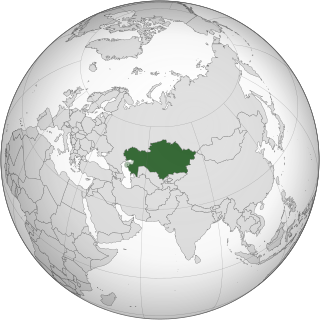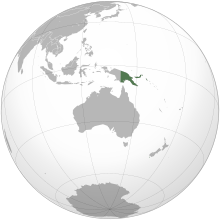A drug policy is the policy regarding the control and regulation of psychoactive substances, particularly those that are addictive or cause physical and mental dependence. While drug policies are generally implemented by governments, entities at all levels may have specific policies related to drugs.

Coffee production in Papua New Guinea is the country's second largest agricultural export, after oil palm, and employs approximately 2.5 million people. It accounts for approximately 1% of world production, according to the United Nations Conference on Trade and Development (UNCTAD).

Cannabis in Palau is illegal, but reports indicate the drug is widely produced and consumed on the island nation. Palau is a former Trust Territory of the Pacific Islands of the United States which gained independence in 1994, and has a population under 20,000.

Although Cannabis use is illegal in Egypt, it is often used privately by many. Law enforcements are often particularly lax when it comes to cannabis smokers, and its use is a part of the common culture for many people in Egypt. However, Large-scale smuggling of cannabis is punishable by death, while penalties for possessing even small amounts can also be severe. Despite this, these laws are not enforced in many parts of Egypt, where cannabis is often consumed openly in local cafes.

Cannabis is illegal in Nigeria, yet the country is a major source of West African-grown cannabis, and ranked the world's third highest consumer of cannabis.
Cannabis in Guyana is illegal for all uses, but is both grown and consumed in the nation. Possession of 15 grams or over can result in charges of drug trafficking.

Cannabis in Cambodia is illegal. This prohibition is enforced opportunistically. Many "Happy" restaurants located in Phnom Penh, Siem Reap and Sihanoukville publicly offer food cooked with marijuana, or as a side garnish.

Cannabis in Syria is illegal. Under the policies of the Syrian Arab Republic cannabis is illegal and punishable by up to 20 years in prison in large drug trafficking offenses, if someone is considered an addict by the Syrian government then they face no criminal penalties for drug use and possession. Since the start of the Syrian civil war cannabis laws have become widely unenforced by the Syrian government as well as Kurdish and rebel controlled territories, while civilians growing cannabis in Jabhat al-Nusra controlled territory face arrest. On multiple occasions Bashar al-Assad granted general amnesties to multiple crimes which included drug trafficking offenses.

Cannabis in Bhutan is illegal, but grows prolifically in the country and has multiple traditional uses, such as feeding pigs and producing textiles.
Cannabis in Sierra Leone is illegal, but is widely cultivated and consumed in the country, and exported to neighboring countries and to Europe. Cannabis is known locally as diamba.
Cannabis in Suriname is illegal. Cannabis is the most popular illegal drug in Suriname.
Cannabis in Lesotho is a traditional crop that remains illegal for any use, but largely tolerated. The plant is known as matekoane in Sesotho language but also called khomo ea fatše, likata or kakana.
Cannabis in Grenada is illegal. Cannabis possession is the most common drug offense on the island, and the annual prevalence of cannabis use amongst adults was reported as 10.8% in 2005.
Cannabis in New Caledonia is illegal, but is cultivated illicitly. Sources note that "hard drugs" are rare in New Caledonia, and their drug issues are primarily confined to cannabis, with local Kanak chiefs being anti-drug and working to eradicate cannabis plantations.

Both the possession and consumption of cannabis, also known as saba in Fijian, are currently illegal in Fiji, if charged, the minimum prison sentencing is three months.
Cannabis in Senegal is illegal; the drug is locally referred to as yamba.

Consuming and possession of cannabis in Kazakhstan is illegal.
Cannabis is illegal in Angola. The drug is locally referred to as diamba or liamba.
Cannabis in Saint Vincent and the Grenadines was prior known to be illegal but is now decriminalized up to 2 ounces. Persons caught with 56 grammes or less of the drug will not be subject to incarceration. Instead, they will be fined a maximum of $500 and be subject to other measures including begin given educational material about cannabis; counselling and rehabilitative care. These provisions were among several amendments that were made to the Drugs Amendment Act (2018), which was passed in Parliament on July 25. In addition to only being a ticketable offense, the amendment provides for Vincentians to smoke the herb in the privacy of their homes and in places of worship of the Rastafarian faith without punishment. The amendment also said that the Minister may designate a list of public areas where the smoking of cannabis may be allowed. The country has correlating legal medical marijuana laws. Parliament on December 11, 2018, passed two Acts, one which establishes a Medical Cannabis Industry in St Vincent and the Grenadines and the other which offers amnesty for traditional marijuana growers. The Vincentian Parliament passed legislation to protect the intellectual property of breeders of new plant varieties in St. Vincent and the Grenadines (SVG), the Plant Breeders’ Protection Bill, 2019. It sets up the jurisprudential framework within which these persons will be able to accrue the rights, how these rights will be protected, how they will be published so that persons in the entire society, in the court and globally, can be aware of the hard work which was done, the agriculture minister said. Under the law, a person must obtain the authorization of a grantee with respect to propagating material of the protected variety, to produce or reproduce, condition the material for the purpose of propagation, offer the material for sale, to sell the material, import or export the material, or stock the material for any of the previous purposes. Regarding infringement of plant breeders’ rights, the following acts are exempt: an act done privately for non-commercial purposes, an act done for experimental purposes, or an act done for the purpose of breeding other plant varieties. The law allows for compulsory licenses where a person may apply to the court for the grant of a compulsory license to exploit a protected variety in SVG. Subject to terms that the court thinks fit, the court may make an order for the grant of compulsory licenses if it is satisfied that the grant of the compulsory licenses is in the public interest. Offense under the law include falsification of register and falsely representing a plant variety as a protected variety. The law also orders the registrar to publish applications for plant breeders’ rights, proposed and approved denominations, withdrawals of application for plant breeders’ rights, the rejection of applications for plant breeders’ rights, any grant of a breeders’ right, any change in the breeder or the agent in respect of a plant variety, lapses of plant breeders’ rights, any invalidation or revocation of a plant breeder's rights, the licenses in relation to plant breeders’ rights, where applicable. Cannabis is widely grown illicitly on the island and is the nation's most valuable agricultural product. Saint Vincent is the most prolific producer of cannabis in the Caribbean, other than Jamaica.
Cannabis in Uganda was legalized as of the 5th of May, 2023 by the Constitutional Court after the law prohibiting its use was nullified. It was ruled that, "[...] since the provisions that banned dealing in miraa were not handled by parliament independent of the rest of the provisions of the Narcotic Drugs and Psychotropic Substances (Control) Act, 2015, it is only prudent that the entire law is nullified"









